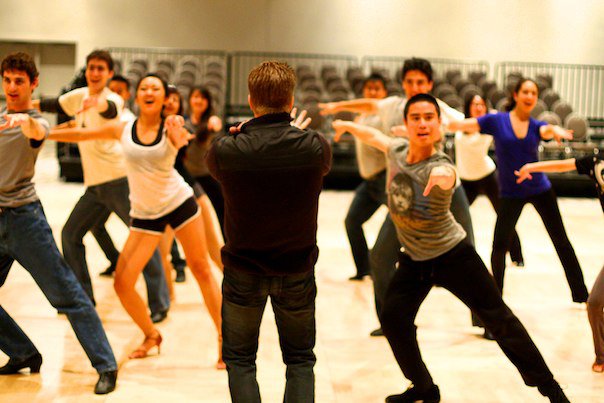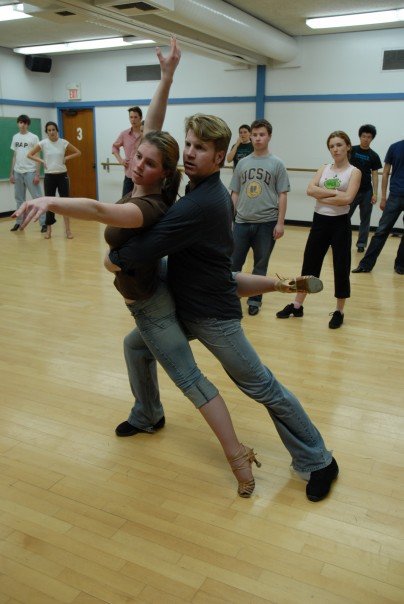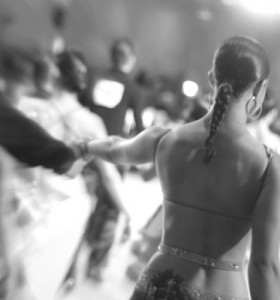Every competitor wants to be a better ballroom dancer, but are you willing to be a better STUDENT? When you take a lesson with your teacher or coach, you except to have an awe-inspiring, motivating session and squeeze the knowledge and experience right out of them and into you. (Wouldn’t that be nice?! Lesson with Yulia, please.)
After all, that’s what you’re paying them for, and that’s why you have selected that coach, out of many options, to work with.
But getting the best from your coach requires some work from the student, too. If we want to get the best out of our coaches, we must be willing to give them our best.

Peter Edwards coaching his UCSD Formation Team
Be Open:
Think of your coach like a doctor or auto mechanic. You wouldn’t go in to see one of these professionals and simply say “Something’s wrong”, expecting them to make a correct diagnosis and provide a solution without any other information.
They may be excellent in their respective fields, but they are not mind readers! Same with dance professionals. They have lots of fantastic information to share, but without a little input from you, they may not be tackling the things that are most important to you, personally.
Sure, once they see you dancing, it is easy to make fixes and start moving your dancing in the direction that they think you need to go, but FEEDBACK from the student is essential to not only making sure that your concerns are met, but also to show that you are truly interested in dedicating yourself to progressing!
That may sound irrational for a teacher to think that someone taking a lesson, who is spending both time and money, is not really interested in learning, but there are students who give off this vibe.
Part of your coach’s job is to be encouraging and a cheerleader, but, his/her primary function is to provide you with KNOWLEDGE that helps you reach your goals.
It is very draining on a coach who feels like they have to create desire in a student-sometimes they can feel like they want it more for you then you do!
When that happens, the coach may feel that all the energy he/she is spending to “light a fire” under the student is not worth it.
Bill Jones, owner of Dance Starz AZ in Phoenix,says this about what encourages him when he works with students:
I love to teach the student who has drive. Drive in making a change in themselves and their lives. Much like a relationship, someone who makes you laugh and you can actually have fun with.
Partner dancing is about relationship between people and the creative process. When you enjoy working with someone, the creativity flows!
Speak Up:
Asking questions is essential to giving your coach information as to what your concerns are and also involving him/her in your understanding of the information.
Don’t be afraid to speak up!
Coaches are inspired by your questions and it helps to gear the coaching in the right direction, when they can understand how you are interpreting what you’ve learned.
Sometimes a student will ensure their instructor that they understand the information, only for the coach to realize on the next lesson, that the student really didn’t understand. It would have been more effective (and a better use of time and money) to be able to CLARIFY from the start.
If you need more time to get something, that is perfectly alright. If the information is over your head, voice that as well.
Let’s point out a big disclaimer here, though:
speaking up and asking questions on your lesson is not the same as directing the lesson, or telling the instructor how to teach!!!
You are there to learn, so rely on the professionalism and expertise of the coach. Sometimes you may have a question about something and the coach will answer it for you, but he/she needs to get you to another place, before it can be properly addressed.
Sometimes this involves taking you out of your comfort zone, or into a whole new place of thinking and feeling, which you’ve never had before.
With this in mind, read on about “being willing.”
Be Willing:

Peter Edwards coaching his UCSD Team
Perhaps inspiring your coach to inspire you can be summed up in the idea of willingness.
Peter Edwards, UC San Diego Dancesport director and owner of Synergy Dance Studio, notes this quality as the key to success.
This is how he describes a student who is easy to teach:
They need to be willing to listen. They need to be willing to try anything. They need to be willing to abandon. They need to be willing to take hold and focus. They need to be willing to talk to the coach and ask questions! They need to be willing to experiment. They need to be willing to practice what is taught.
Someone who is not willing can not learn. I’m not talking about wanting… I am talking about willing!
Show the coach that you are eager to try new things and new ideas-after all, isn’t that why you’re working with them?
The more he/she sees your interest, the more he/she will be inspired to invest themselves in you.
Being an ACTIVE participant in your own lessons will be a rewarding, productive, creative process for everyone involved.
- Write your Dance: Improve your dancing through journaling - November 12, 2019
- The Difference Between Oversway and Throwaway: Ballroom Video Preview - June 8, 2018
- Principles of Movement: Ballroom Basics Video - September 21, 2016

we respect your privacy and will never share your information! Unsubscribe at any time.



